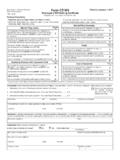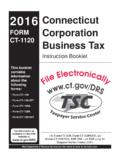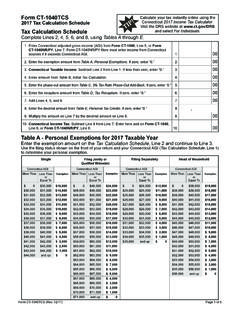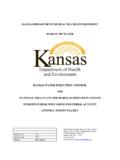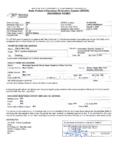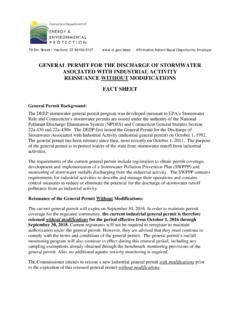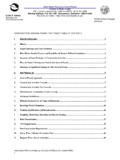Transcription of General Permit for the Discharge of Stormwater …
1 Bureau of Materials Management & Compliance Assurance DEEP-WPED-GP-014 10/1/16 General Permit for the Discharge of Stormwater associated with industrial activity Effective Date: October 1, 2016 Expiration Date: September 30, 2018 Bureau of Materials Management & Compliance Assurance DEEP-WPED-GP-014 2 of 70 10/1/16 General Permit for the Discharge of Stormwater associated with industrial Activities Table of Contents Section 1. Authority 4 Section 2. Definitions 4 Section 3. Authorization Under This General Permit 8 (a) Eligible Activities 8 (b) Requirements for Authorization 8 (c) Registration 10 (d) No Exposure Certification 10 (e) Geographic Area 10 (f) Effective Date and Expiration Date of this General Permit 10 (g) Effective Date of Authorization 11 (h) Revocation of an Individual Permit 11 (i) Issuance of an Individual Permit 11 Section 4.
2 Registration Requirements 11 (a) Who Must File a Registration 11 (b) Scope of Registration 12 (c) Contents of Registration 12 (d) Availability of Registration and Plan 14 (e) Where to File a Registration 15 (f) Additional Information 15 (g) Additional Notification 15 (h) Action by Commissioner 16 Section 5. Conditions of this General Permit 16 (a) Conditions Applicable to Certain Discharges 16 (b) Control Measures 17 (c) Stormwater Pollution Prevention Plan (Plan) 22 (d) Inspections 29 (e) Monitoring Requirements 29 (f) Additional Requirements for Certain Sectors 38 (g) Discharges to Impaired Waters 66 (h) Reporting & Record Keeping Requirements 67 (i) Regulations of Connecticut State Agencies Incorporated into this General Permit 68 Section 6. General conditions 68 (a) Reliance on Registration 68 (b) Duty to Correct and Report Violations 68 (c) Duty to Provide Information 69 (d) Certification of Documents 69 (e) Date of Filing 69 (f) False Statements 69 (g) Correction of Inaccuracies 69 (h) Transfer of Authorization 69 (i) Other Applicable Law 70 (j) Other Rights 70 Section 7.
3 Commissioner s Powers 70 (a) Abatement of Violations 70 (b) General Permit Revocation, Suspension, or Modification 70 (c) Filing of an Individual Application 70 Bureau of Materials Management & Compliance Assurance DEEP-WPED-GP-014 3 of 70 10/1/16 Addendum: General Permit Modification for bulk solid deicing material storage issued December 3, 2013 Appendix A: industrial Stormwater General Permit SIC Code Definitions Appendix B: industrial Stormwater Monitoring Guidance Appendix C: Aquifer Protection Areas and Other Groundwater Drinking Supply Areas Guidance Bureau of Materials Management & Compliance Assurance DEEP-WPED-GP-014 4 of 70 10/1/16 General Permit for the Discharge of Stormwater associated with industrial activity Section 1. Authority This General Permit is issued under the authority of section 22a-430b of the Connecticut General Statutes.
4 Section 2. Definitions The definitions of terms used in this General Permit shall be the same as the definitions contained in sections 22a-423 and 22a-207 of the Connecticut General Statutes and section 22a-430-3(a) of the Regulations of State Agencies. As used in this General Permit , the following definitions shall apply: 25-year, 24-hour rainfall event means the maximum 24-hour precipitation event with a probable recurrence interval of once in 25 years, as defined by the National Weather Service in Technical Paper Number 40, Rainfall Frequency Atlas of the United States, May 1961, and subsequent amendments, or equivalent regional or state rainfall probability information developed therefrom. 100-year, 24-hour rainfall event means the maximum 24-hour precipitation event with a probable recurrence interval of once in 100 years, as defined by the National Weather Service in Technical Paper Number 40, Rainfall Frequency Atlas of the United States, May 1961, and subsequent amendments, or equivalent regional or state rainfall probability information developed therefrom.
5 Agricultural wastes means organic materials normally associated with the production and processing of food and fiber on farms, feedlots and forests. Such wastes may include, but are not limited to, manures, bedding materials, spilled feed or feed waste, and crop residues. Aquifer protection area means aquifer protection area as defined in section 22a-354h of the Connecticut General Statutes. Authorized activity means any activity authorized under this General Permit . Benchmark means a standard by which Stormwater Discharge quality is measured as identified in section 5(e)(1)(B) of this Permit . Coastal area shall be the same as the definition contained in section 22a-94 of the Connecticut General Statutes. Coastal waters shall be the same as the definition contained in section 22a-93(5) of the Connecticut General Statutes.
6 Commissioner means the commissioner as defined by section 22a-2(b) of the Connecticut General Statutes. Compost means the product of composting. Composting means the process of accelerated aerobic biodegradation and stabilization of organic material under controlled conditions that results in a finished product called compost. Department means the department of energy and environmental protection. Bureau of Materials Management & Compliance Assurance DEEP-WPED-GP-014 5 of 70 10/1/16 Fresh-tidal wetland means a tidal wetland with an average salinity of less than parts per thousand. Grab sample means an individual sample collected in less than fifteen (15) minutes. Guidelines means the 2002 Connecticut Guidelines for Soil Erosion and Sediment Control, as amended, or as may be amended, established pursuant to section 22a-328 of the Connecticut General Statutes.
7 High tide line shall be the same as that contained in section 22a-359(c) of the Connecticut General Statutes. Impaired waters means those surface waters of the state designated by the commissioner as impaired pursuant to Section 303(d) of the Clean Water Act and as identified in the most recent State of Connecticut Integrated Water Quality Report. Individual Permit means a Permit issued to a named permittee under section 22a-430 of the Connecticut General Statutes. industrial activity means any activity listed below with primary Standard industrial Classification (SIC) codes as identified by Standard industrial Classification Manual, Executive Office of the President, Office of Management and Budget 1987 or a primary activity described in narrative form below: (1) An activity subject to Stormwater effluent limitation guidelines, new source performance standards, or toxic pollutant effluent standards under 40 CFR Subchapter N as included in this General Permit ; (2) An activity classified as Standard industrial Classification 24 (except 2434), 26 (except 265 and 267), 28 (except 283 and 285), 29, 311, 32 (except 323), 33, 3441 and 373.
8 (3) An activity classified as Standard industrial Classification 10 through 14 (mining industry) including active or inactive mining operations that are not stabilized; or oil and gas exploration, production, processing, or treatment operations; or transmission facilities that Discharge Stormwater that has come into contact with any overburden, raw material, intermediate products, finished products, by-products or waste products; (4) Hazardous waste treatment, storage, or disposal facilities, including those facilities operating under interim status or a Permit pursuant to section 22a-449(c) or 22a-454 of the Connecticut General Statutes; or hazardous waste transportation activities conducted pursuant to these statutes; (5) Recycling centers, resource recovery facilities and all such facilities and centers as defined in section 22a-207 of the Connecticut General Statutes, including facilities classified as Standard industrial Classification 4953; solid waste facilities (where waste and/or leachate are exposed or potentially exposed to rainfall); intermediate processing facilities; or facilities that are subject to regulation under Subtitle D of the Resource Conservation and Recovery Act, 42 sections 6901, et seq; (6) Facilities involved in the recycling (including assembling, breaking up, sorting and wholesale or retail distribution) of materials including metal scrap yards, battery reclaimers, salvage yards, and automobile junk yards, or those facilities classified as Standard industrial Classification 5015 and 5093.
9 Bureau of Materials Management & Compliance Assurance DEEP-WPED-GP-014 6 of 70 10/1/16 (7) Steam electric power generating facilities classified as Standard industrial Classification 4911, including coal-handling sites for these facilities; (8) Transportation facilities classified as Standard industrial Classifications 40, 41, 42 (except 4221-25), 44, 45 or retail truck stops (within SIC 5541) that have maintenance or fueling operations. Also included in this definition are vehicle service and storage facilities (including, but not limited to, public works garages) operated by federal, state or municipal government which have vehicle maintenance or repair shops, equipment cleaning, fueling or maintenance operations, road salt storage, or airport deicing operations. Also included in this definition are yacht clubs (within SIC 7997) or boat dealers (SIC 5551) that have onsite engine service or repair, vehicle or equipment cleaning, painting operations, hull maintenance and repair (including, but not limited to, sanding, chemical stripping and painting) or fueling operations; (9) Treatment works with a design capacity of greater than one million gallons per day (1 MGD) treating domestic sewage (or any other sewage sludge or wastewater treatment device or system) used in the storage, treatment, recycling, and reclamation of municipal or domestic sewage, including land dedicated to the disposal of sewage sludge that is located within the confines of the facility.
10 This definition does not include farm lands; domestic gardens or lands used for sludge management where sludge is beneficially reused and which are not physically located in the confines of the facility; or areas that are in compliance with 40 CFR 503; (10) An activity classified as Standard industrial Classifications 20, 21, 22, 23, 2434, 25, 265, 267, 27, 283, 285, 30, 31 (except 311), 323, 34 (except 3441), 35, 36, 37 (except 373), 38, 39, 4221 - 25, (provided the activity is not otherwise included within categories (2) through (9), (11) or (12)), and has material handling equipment or activities, raw materials, intermediate products, final products, waste materials, by-products or industrial machinery exposed to Stormwater ; (11) Facilities classified as Standard industrial Classification 5171 (Petroleum Bulk Stations and Terminals); (12) Road salt and deicing material storage facilities, including facilities storing pure salt or other deicing materials or deicing materials mixed with other materials; (13) Wood processing facilities not otherwise described under this subsection, including but not limited to, mulching, chipping, and mulch coloring for retail or wholesale; (14) Small-scale composting facilities (as defined in this section) where composting is the primary activity , business, or purpose of the Inland wetland means wetlands as that term is defined in section 22a-38 of the Connecticut General Statutes.

